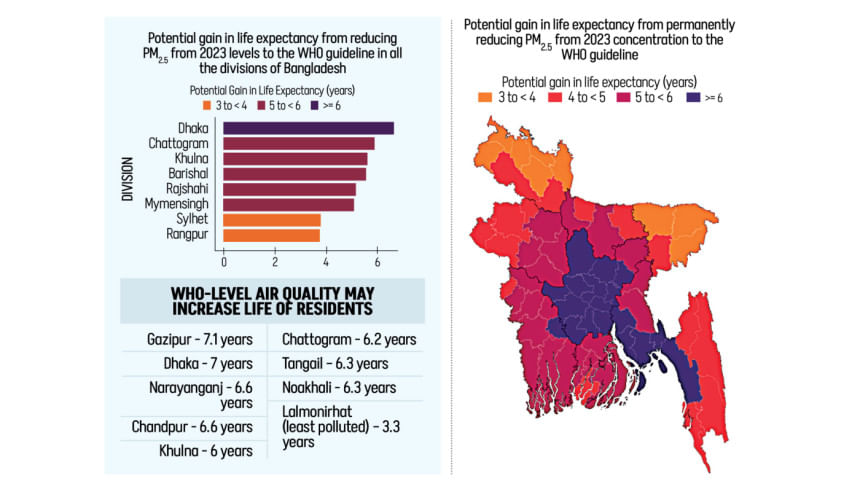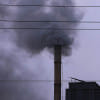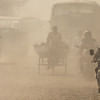Bangladeshis losing 5.5 years to toxic air

Air pollution is cutting Bangladeshis' average life expectancy by 5.5 years, making it the country's deadliest external health risk, according to a report published yesterday.
The global annual report of the Air Quality Life Index (AQLI), published by the University of Chicago's Energy Policy Institute (EPIC), warns that health toll caused by particulate matter (PM) pollution far exceeds that of tobacco use, malnutrition, or unsafe water. Smoking reduces life by about two years, malnutrition by 1.4.
"Even with full action, it will take years to reduce air pollution. We also need quality fuel, otherwise the air will remain polluted."
"Bangladeshis are losing more years of life to dirty air than to smoking or malnutrition," said Michael Greenstone, director of EPIC and creator of the AQLI.
The study shows that all of Bangladesh's 166.8 million residents are exposed to fine particulate pollution above both the World Health Organization (WHO) guideline of five micrograms per cubic meter and the national standard of 35.
Lalmonirhat, the least polluted district, records seven times the WHO threshold.
Between 1998 and 2023, the country's PM2.5 pollution -- particles smaller than 2.5 micrometres -- surged by 66 percent, eroding 2.4 years of life expectancy. In 2023, annual average PM2.5 rose to 60.8 micrograms, 1.7 times the national standard and more than 12 times the WHO guideline.
"If PM2.5 concentrations in Bangladesh were reduced to meet WHO limits, an average resident could live 5.5 years longer," the report states.
Dhaka faces one of the gravest impacts, with residents potentially living nearly seven years longer under WHO standards. Meeting the weaker national standard would still add over four years.
In Chattogram, residents could gain 6.2 years under WHO limits and 3.3 years under the national threshold.
Together, Dhaka and Chattogram -- home to nearly half the country's population -- would see average life expectancy rise by over six years.
Other centres show similar risks.
In Gazipur, residents could gain 7.1 years with cleaner air, while Narayanganj residents could add 6.6 years. In Comilla, Tangail, Khulna, and Mymensingh, the gains would range between five and six years, and in Sylhet 3.5 years.
The AQLI's 2023 data shows global PM2.5 concentrations were 1.5 percent higher than that of 2022. Its toll on life expectancy is four times that of alcohol use, and five times that of transport injuries or unsafe water and sanitation.
In 2022, Bangladesh's Ministry of Environment, Forest and Climate Change formulated the Air Pollution Control Rules. These require a National Air Quality Control Plan, nationwide monitoring, identification of pollution-causing activities, and emission standards for industry, automobiles, and major projects.
In Dhaka, the 2019 brick kiln law bars kilns near residential, commercial, agricultural, and sensitive areas.
As a punitive step, the government last week declared Savar a "degraded airshed" and said operations of all brick kilns, except Tunnel Kilns and Hybrid Hoffman Kilns, will be restricted from next month.
Sources of PM2.5 include transboundary pollution, brick kilns, smoke from low-grade fuels, solid waste burning, and dust from construction. Brick kilns around Dhaka alone cause 58 percent of the city's air pollution. On February 24, the High Court ordered the removal of all illegal brick kilns nationwide.
Speaking to The Daily Star, Environment Adviser Syeda Rizwana Hasan said 3,491 kilns without clearance would be shut down, and illegal hill kilns relocated. "We have already instructed closure of illegal kilns and are conducting drives at construction sites. The biggest challenge now is phasing out old vehicles.
"Even with full action, it will take years to reduce air pollution. We also need quality fuel, otherwise the air will remain polluted."

 For all latest news, follow The Daily Star's Google News channel.
For all latest news, follow The Daily Star's Google News channel. 







Comments